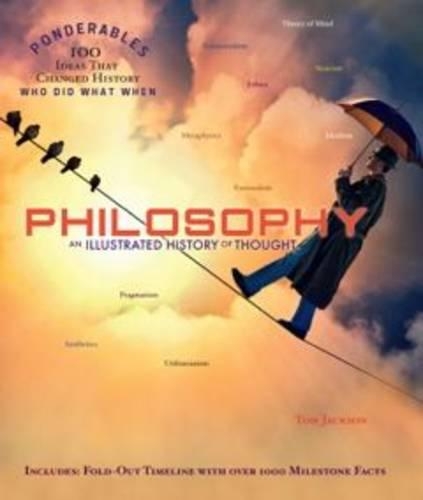
Philosophy: An Illustrated History of Thought (Ponderables 100 Ideas That Changed History Who Did What When)
(Hardback)
Publishing Details
Philosophy: An Illustrated History of Thought (Ponderables 100 Ideas That Changed History Who Did What When)
By (Author) Tom Jackson
Shelter Harbor Press
Shelter Harbor Press
1st October 2014
United States
Classifications
Physical Properties
Hardback
168
Width 240mm, Height 282mm, Spine 30mm
1293g
Description
Both art and science attempt answers to the big questions - what is truth, how to be good, and where did we come from - but philosophy is the interpreter we turn to verify it all. We need it to make sense of the simplest math and the most esoteric of poetry and it has even created a science of information itself. We begin our journey at the boundary of myth and reason and along the way we visit the thoughts of the most high-flying of mids, Socrates, Descartes, Kant and others, who could see that nothing, not ever-changing words, limitless numbers or mystical vistions, were beyond examination. And we shall see that philosophy, far from being the work of dead geniuses, is today at the heart of our battle to make sense of the quantum Universe.
Reviews
"This thoughtful and engagingly illustrated large-format book is popular science writer Jackson's (Mathematics: An Illustrated History of Numbers) fifth entry in the series. It chronologically presents '100 Ideas That Changed the World'--from monism and the Tao, through the 'five ways, ' utopia, Kant's Critique of Pure Reason, and Hegel's Spirit, up to philosophical zombies and 'is [existence] a computer simulation'--each summarized in a half or a whole page or a spread. Jackson rounds out the book with descriptions of the 'schools' of philosophy and brief lives of the great philosophers. The included fold-out wall chart contextualizes the history of philosophy amid world events, science and invention, and culture. The chart's back adds biographies of 35 more exceptional minds that shaped the discipline. VERDICT: A colorful, thought-provoking book that presents the broad sweep of philosophical topics and figures with token attention to non-Western thinkers and women in the field. While suitable for high school and above, the text is occasionally marred by inaccuracies, and some explanations will make sense only to readers already familiar with the concept described. Stephen Law's Philosophy and David Papineau's Philosophy are quality alternatives by established philosophers." -- Steve Young, McHenry County College, Crystal Lake, IL Library, January 1, 2015
Author Bio
Tom Jackson is a science writer based in the United Kingdom. Tom specializes in recasting science and technology into lively historical narratives. After almost 20 years of writing, Tom has uncovered a wealth of stories that help create new ways to enjoy learning about science. He studied at the University of Bristol and still lives in the city with his wife and three children.
